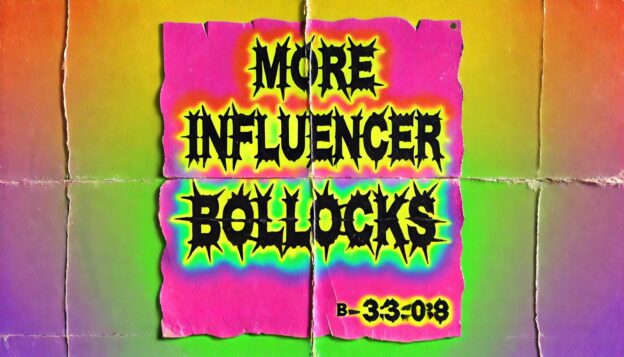Influencer culture has taken over the digital landscape, promising fame, fortune, and free products for anyone with enough followers and a well-curated feed. From Instagram and TikTok to YouTube and beyond, the idea of becoming a full-time influencer is pitched as a dream lifestyle. But behind the filters, brand deals, and viral dances lies a world filled with exploitation, inflated promises, and, yes, bollocks.
Come with me and let’s unpack the myths and marketing fluff behind the influencer industry in episode twenty-six of my satirical comedic polemic series.
“Anyone Can Be an Influencer”
One of the most persistent myths is that anyone with a smartphone and some creativity can become an influencer. While platforms like TikTok have made it easier to go viral, the reality is that sustaining a career as an influencer requires a mix of business acumen, relentless content production, and a lot of luck.
For every influencer earning six figures, there are thousands struggling to monetise their platforms or maintain relevance. The idea that anyone can make it big in the influencer world is misleading bollocks that downplays the harsh realities of the industry.
“It’s All Passive Income”
Many influencers present their income as effortless, just a matter of posting a few photos or videos and watching the money roll in. In reality, successful influencers work long hours planning, creating, and editing content, managing partnerships, and engaging with their audience.
The passive income narrative is often pushed by influencers trying to sell courses on “how to be an influencer,” turning their followers into customers rather than peers. The claim that influencing is easy money is pure bollocks.
“Followers Equal Influence”
Brands often choose influencers based on their follower count, but having a large audience doesn’t always translate to real influence. Fake followers, bought engagement, and algorithmic anomalies can inflate numbers, creating the illusion of popularity.
What matters more is the quality of engagement and the authenticity of an influencer’s relationship with their audience. The myth that big numbers mean big impact is one of the most obvious pieces of influencer bollocks.
“Brand Deals Are Glamorous”
From sponsored posts to free products, brand deals are often portrayed as the pinnacle of influencer success. But many of these partnerships come with strings attached, including tight deadlines, creative restrictions, and unrealistic expectations from brands.
Some companies exploit micro-influencers by offering “exposure” instead of fair compensation, while others require influencers to sign contracts that demand exclusivity or control over their content. The notion that brand deals are always a glamorous win-win is overhyped bollocks.
“Authenticity Is Everything”
Influencers love to emphasise their authenticity, claiming to share their “real” lives with followers. But much of what we see is carefully curated, edited, and staged. From rented private jets to photoshopped bodies, the line between reality and performance is often blurred.
Even when influencers open up about struggles or vulnerabilities, these moments are often monetised as part of their brand. The idea that influencer culture is rooted in authenticity is contrived bollocks designed to maintain audience trust.
“The Algorithm Loves Me”
Going viral or gaining followers is often chalked up to being in the algorithm’s favour, as if success is simply a matter of luck. While algorithms do play a role, many influencers invest heavily in analytics tools, content strategies, and advertising to grow their audience.
The myth that influencers are just lucky recipients of algorithmic blessings ignores the strategic effort behind their success. It’s convenient bollocks that masks the hustle involved.
“It’s All About the Content”
While content quality is important, the success of many influencers is often tied to networking, timing, and capital. Collaborations with bigger influencers, access to professional production tools, and early adoption of platform trends can make or break careers.
The idea that great content alone guarantees success is idealistic bollocks that ignores the broader context of privilege and opportunity.
“Followers Are Loyal Fans”
Influencers often talk about their “community,” implying a deep connection with their followers. But audiences are fickle, and social media platforms make it easy for fans to jump to the next big thing. Cancel culture, algorithm changes, and oversaturation mean that loyalty is fragile at best.
The claim that influencer audiences are steadfast fans is more fantasy than reality, yet another piece of influencer bollocks.
“This Product Changed My Life”
Influencers regularly promote products with over-the-top enthusiasm, claiming they’ve transformed their lives. While some of these endorsements are genuine, many are part of paid sponsorships that require influencers to stick to a script.
Even worse, some influencers push dubious or harmful products like detox teas, “miracle” skincare, or unregulated supplements. The narrative that every promoted product is a life-changing must-have? It’s just marketing bollocks.
“Being an Influencer Is a Career for Life”
Influencing is often presented as a stable career path, but in reality, it’s highly volatile. Trends, platforms, and audience interests shift rapidly, and many influencers struggle to stay relevant. Burnout is also a significant issue, with the constant pressure to produce content taking a toll on mental health.
The idea that influencing is a long-term, secure career is misleading bollocks that downplays its inherent instability.
Conclusion: The Influencer Bubble Is Full of Bollocks
The influencer industry is a fascinating and rapidly evolving space, but it’s also rife with overblown claims and unrealistic expectations. From the myth of overnight success to the illusion of authenticity, much of what we see is carefully crafted to maintain the façade of an idealised lifestyle.
If you’re considering diving into the world of influencing, approach it with caution and a healthy dose of scepticism. Because while influencing can be rewarding, much of what’s sold about it is, quite simply, bollocks.
